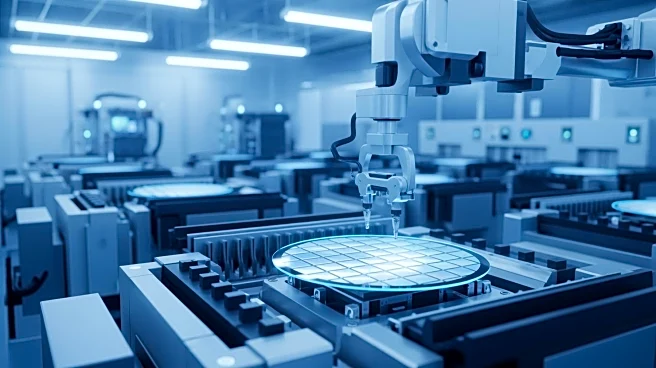What's Happening?
Nvidia CEO Jensen Huang has requested Taiwan Semiconductor to boost its wafer production, indicating strong demand for Nvidia's AI chips. This request aligns with Huang's previous comments about $500 billion in order visibility for Nvidia's products.
The demand for wafers, essential for semiconductor chip production, is a positive sign for Nvidia, reflecting the company's expectations of continued growth in AI applications. The SEMI Silicon Manufacturers' Group reported a 3.1% year-over-year increase in global silicon wafer shipments in the third quarter of 2025, driven by AI application demand. Nvidia's stock rose nearly 5% on Monday, rebounding from a previous tech sector downturn.
Why It's Important?
Nvidia's request for increased wafer production underscores the growing demand for AI chips, which are pivotal in advancing technology sectors such as machine learning and data processing. This development is significant for the U.S. tech industry, as it highlights the ongoing expansion and investment in AI technologies. The increase in wafer production could lead to enhanced capabilities and innovation in AI applications, benefiting companies that rely on advanced computing power. Additionally, the rise in Nvidia's stock reflects investor confidence in the company's growth prospects, potentially influencing market dynamics and investment strategies in the tech sector.
What's Next?
The request for increased wafer production may lead to expanded manufacturing capabilities at Taiwan Semiconductor, potentially affecting global supply chains and production timelines. U.S. tech companies might experience increased competition and pressure to innovate as AI chip demand grows. Investors and stakeholders will likely monitor Nvidia's performance and strategic moves closely, as they could impact broader market trends. The ongoing government shutdown resolution may also influence market stability and investor sentiment, affecting future trading and investment decisions.
Beyond the Headlines
The emphasis on AI chip production raises ethical considerations regarding data privacy and security, as these technologies become more integrated into everyday applications. The demand for AI chips could drive advancements in computing power, leading to new possibilities in fields such as healthcare, autonomous vehicles, and smart infrastructure. Long-term, the focus on AI technology may shift cultural perceptions of automation and artificial intelligence, influencing societal norms and expectations.















